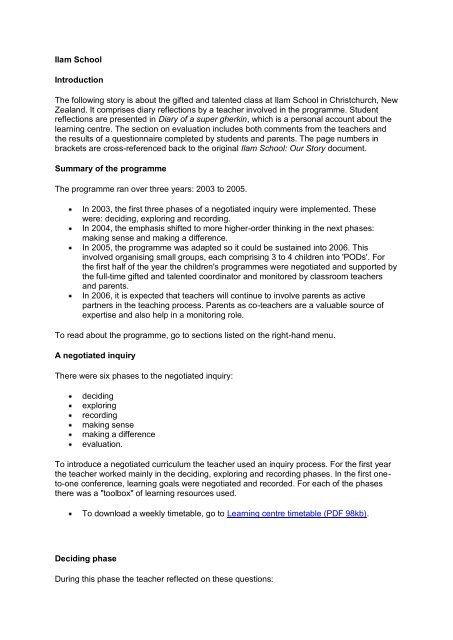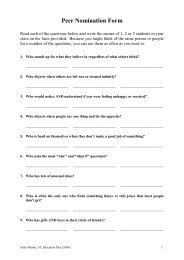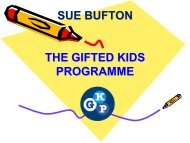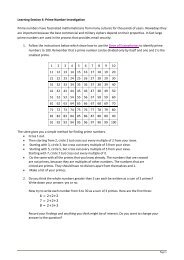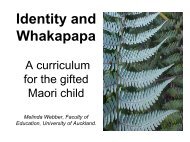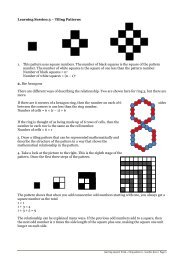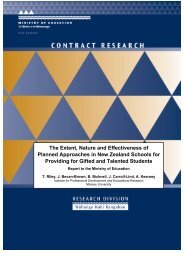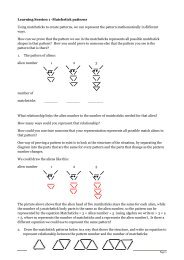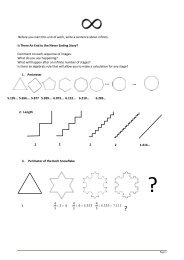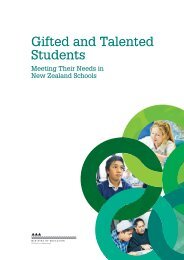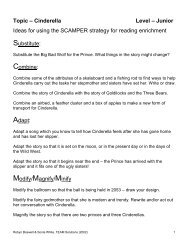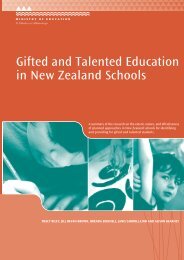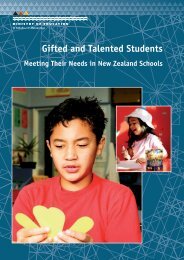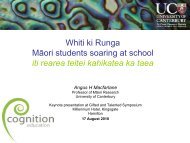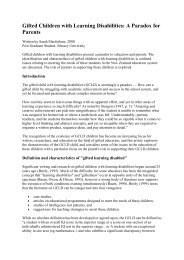Ilam School Introduction The following story is about the gifted and ...
Ilam School Introduction The following story is about the gifted and ...
Ilam School Introduction The following story is about the gifted and ...
You also want an ePaper? Increase the reach of your titles
YUMPU automatically turns print PDFs into web optimized ePapers that Google loves.
<strong>Ilam</strong> <strong>School</strong><strong>Introduction</strong><strong>The</strong> <strong>following</strong> <strong>story</strong> <strong>is</strong> <strong>about</strong> <strong>the</strong> <strong>gifted</strong> <strong>and</strong> talented class at <strong>Ilam</strong> <strong>School</strong> in Chr<strong>is</strong>tchurch, NewZeal<strong>and</strong>. It compr<strong>is</strong>es diary reflections by a teacher involved in <strong>the</strong> programme. Studentreflections are presented in Diary of a super gherkin, which <strong>is</strong> a personal account <strong>about</strong> <strong>the</strong>learning centre. <strong>The</strong> section on evaluation includes both comments from <strong>the</strong> teachers <strong>and</strong><strong>the</strong> results of a questionnaire completed by students <strong>and</strong> parents. <strong>The</strong> page numbers inbrackets are cross-referenced back to <strong>the</strong> original <strong>Ilam</strong> <strong>School</strong>: Our Story document.Summary of <strong>the</strong> programme<strong>The</strong> programme ran over three years: 2003 to 2005.In 2003, <strong>the</strong> first three phases of a negotiated inquiry were implemented. <strong>The</strong>sewere: deciding, exploring <strong>and</strong> recording.In 2004, <strong>the</strong> emphas<strong>is</strong> shifted to more higher-order thinking in <strong>the</strong> next phases:making sense <strong>and</strong> making a difference.In 2005, <strong>the</strong> programme was adapted so it could be sustained into 2006. Th<strong>is</strong>involved organ<strong>is</strong>ing small groups, each compr<strong>is</strong>ing 3 to 4 children into 'PODs'. For<strong>the</strong> first half of <strong>the</strong> year <strong>the</strong> children's programmes were negotiated <strong>and</strong> supported by<strong>the</strong> full-time <strong>gifted</strong> <strong>and</strong> talented coordinator <strong>and</strong> monitored by classroom teachers<strong>and</strong> parents.In 2006, it <strong>is</strong> expected that teachers will continue to involve parents as activepartners in <strong>the</strong> teaching process. Parents as co-teachers are a valuable source ofexpert<strong>is</strong>e <strong>and</strong> also help in a monitoring role.To read <strong>about</strong> <strong>the</strong> programme, go to sections l<strong>is</strong>ted on <strong>the</strong> right-h<strong>and</strong> menu.A negotiated inquiry<strong>The</strong>re were six phases to <strong>the</strong> negotiated inquiry:decidingexploringrecordingmaking sensemaking a differenceevaluation.To introduce a negotiated curriculum <strong>the</strong> teacher used an inquiry process. For <strong>the</strong> first year<strong>the</strong> teacher worked mainly in <strong>the</strong> deciding, exploring <strong>and</strong> recording phases. In <strong>the</strong> first oneto-oneconference, learning goals were negotiated <strong>and</strong> recorded. For each of <strong>the</strong> phases<strong>the</strong>re was a "toolbox" of learning resources used.To download a weekly timetable, go to Learning centre timetable (PDF 98kb).Deciding phaseDuring th<strong>is</strong> phase <strong>the</strong> teacher reflected on <strong>the</strong>se questions:
What do I want <strong>the</strong>se children to learn?What does it mean to decide, explore, record, make sense, evaluate, <strong>and</strong> make adifference?How can I scaffold th<strong>is</strong> learning for my learners?How can I engage <strong>the</strong>m in thinking <strong>about</strong> thinking <strong>and</strong> becoming reflective learners?What <strong>is</strong> powerful learning <strong>and</strong> teaching? [p. 4]Toolbox resources used in <strong>the</strong> deciding phase:Task map, Resource suitcase, KW map, Questions <strong>the</strong> keys to <strong>the</strong> treasure. [p. 5]Exploring phase<strong>The</strong> teacher sought answers from:<strong>the</strong> children <strong>and</strong> <strong>the</strong>ir parents through three-way conferencesreading resources by <strong>the</strong> <strong>following</strong> authors including 'Learning to Think, Thinking toLearn' by Michael Pohl, 2000 (Hawker Brownlow Education 2000), Lane Clarke,Benjamin Bloom, Tony Ryan, Wiliams, Renzulli, Linda Silverman, June Maker,S<strong>and</strong>ra Kaplan, Franco<strong>is</strong> Gagne, 'Information Toolkit', User Friendly ResourceEnterpr<strong>is</strong>es Ltd. [p. 4]Toolbox resources used in <strong>the</strong> exploring phase:Treasure digger, Five senses, Picture think, Video think. [p. 5]Recording phaseTo scaffold <strong>the</strong> children's learning, <strong>the</strong> teacher developed a range of organ<strong>is</strong>ers <strong>and</strong>presented <strong>the</strong>m as tools to be used at each stage of <strong>the</strong> inquiry process. <strong>The</strong> children usedan inquiry wheel, developed from <strong>the</strong> work of Lane Clarke, to plan <strong>the</strong>ir inquiries. <strong>The</strong> insidecircle [of <strong>the</strong> wheel] gave <strong>the</strong>m <strong>the</strong> triggers to write meaningful inquiry tasks <strong>and</strong> <strong>the</strong> outsidecircle gave tools to support learning. <strong>The</strong> children used a task map to track <strong>the</strong>ir progress. [p.4]Toolbox resources used in <strong>the</strong> recording phase:Experiment think, Hi<strong>story</strong> think, Animal think, Story board. [p. 5]Teacher reflections<strong>The</strong> teacher reflections have been organ<strong>is</strong>ed into <strong>the</strong> <strong>following</strong> categories <strong>and</strong> by schoolyear. (<strong>The</strong> page numbers in brackets are cross-referenced back to <strong>the</strong> original <strong>Ilam</strong> <strong>School</strong>:Our Story document.)On th<strong>is</strong> page: <strong>the</strong> overall programme | <strong>the</strong> participating students | <strong>the</strong> learning process | <strong>the</strong>selection of topics | parents <strong>and</strong> staffTeacher reflections <strong>about</strong> <strong>the</strong> programme2003Dawn of an epic journey: I feel buoyed up by <strong>the</strong> programme <strong>and</strong> its fluid nature. I lovebouncing ideas with <strong>the</strong> children. <strong>The</strong>re <strong>is</strong> a lot of energy in <strong>the</strong> room, <strong>the</strong>ir thinking <strong>is</strong>amazing. It's like dipping into a deep well – you never know what will come up or how fardown you will go (February, 2003). [p. 1]
<strong>The</strong> learning jungle: It's so hard to accommodate six teachers, 30 parents (times two) <strong>and</strong> 30children! (Week 9). At <strong>the</strong> moment <strong>the</strong>re <strong>is</strong> no team approach to <strong>is</strong>sues <strong>and</strong> a lot of behind<strong>the</strong>-scenesd<strong>is</strong>cussion between staff <strong>and</strong> I am not involved. All <strong>the</strong> <strong>is</strong>sues seem to be myproblem. <strong>The</strong>re needs be a collective approach to children but at <strong>the</strong> same time we need acollective philosophy to guide that approach <strong>and</strong> it needs to reflect in part <strong>the</strong> power-sharingphilosophy of <strong>the</strong> learning centre. [p. 6]One-to-one conferences, twice a term – although time consuming – are also time well spentbecause of <strong>the</strong> learning power. In <strong>the</strong> first conference we negotiate <strong>and</strong> record <strong>the</strong> learninggoals. <strong>The</strong> second conference <strong>is</strong> a means of negotiating <strong>the</strong> learning outcomes. Parentalinvolvement enables ano<strong>the</strong>r perspective a form of triangulation. [p. 8]Teacher reflections <strong>about</strong> <strong>the</strong> students2003Gifted learners know <strong>the</strong>mselves. <strong>The</strong>y know what <strong>the</strong>y want to know <strong>and</strong> how <strong>the</strong>y prefer tolearn. <strong>The</strong>y need help to develop strategies to think at <strong>the</strong> level of analys<strong>is</strong> <strong>and</strong> creativeproblem solving. [p. 3]Are <strong>gifted</strong> kids naturally great thinkers or are <strong>the</strong>y fantastic sponges that need to be taughthow to think with <strong>the</strong> information <strong>the</strong>y absorb? [p. 11]2004<strong>The</strong> children developed a common language to describe <strong>the</strong>ir <strong>gifted</strong> character<strong>is</strong>tics. I ambeginning to see that <strong>the</strong>re are more perspectives than <strong>the</strong>ir own <strong>and</strong> that m<strong>is</strong>conceptionscan explain many moments of conflict. Some children felt very exposed <strong>and</strong> d<strong>is</strong>sat<strong>is</strong>fied with<strong>the</strong>mselves. Some children didn't engage <strong>and</strong> remained flippant. [p. 19]Generally <strong>the</strong> children wanted desperately to be included <strong>and</strong> seen as normal. <strong>The</strong>y alsowanted to be kids not brains. [p. 19]My role <strong>is</strong> changing <strong>and</strong> I am becoming more involved with individual social/emotionalneeds. <strong>The</strong>re are still huge power <strong>is</strong>sues for some children as <strong>the</strong>y struggle with adults <strong>and</strong>peers who are controlling. Children with heightened sensitivities are incensed byrelationships that are less than fair or not respectful. <strong>The</strong>y respond with a degree of emotionwhich <strong>is</strong> often unexpected <strong>and</strong> m<strong>is</strong>understood. I'm not sure if I help or hinder <strong>the</strong> process byacknowledging <strong>the</strong>ir feelings <strong>and</strong> perspectives. [p. 18]Perceptive children may need help in underst<strong>and</strong>ing that o<strong>the</strong>r people are less perceptivethan <strong>the</strong>m. [p. 20]Divergent thinkers have difficulty with linear organ<strong>is</strong>ation structures (classrooms) <strong>and</strong> appeard<strong>is</strong>organ<strong>is</strong>ed <strong>and</strong> absent minded. [p. 20]2005Celebrations of learning: Gifted kids respond to positive <strong>and</strong> constructive feedback. <strong>The</strong>yneed to know that what <strong>the</strong>y know <strong>is</strong> valued <strong>and</strong> appreciated even more than regular kidsbecause often <strong>the</strong>y feel unsure of <strong>the</strong>mselves because <strong>the</strong>y are different. I believe that youcan never pra<strong>is</strong>e <strong>the</strong>se children enough. A good dollop of pra<strong>is</strong>e <strong>is</strong> as effective as a dose ofMaxi-crop. Like <strong>the</strong> plants <strong>the</strong>y flour<strong>is</strong>h <strong>and</strong> strive even harder to reach <strong>the</strong>ir goals. [p. 25]
Teacher reflections <strong>about</strong> <strong>the</strong> learning process2003Finding our way: Curriculum maps <strong>and</strong> task maps were introduced as a way of planning ourinquiries. Initially <strong>the</strong> children <strong>and</strong> I were overcome with <strong>the</strong> enormity of <strong>the</strong> process. Initialtrigger words had to be simplified – possibly had too many choices at each stage of <strong>the</strong>inquiry. I need to be more confident with some triggers so that I can guide <strong>the</strong> children morepurposefully. [p. 1]Children are having problems switching between a teacher who <strong>is</strong> willing to give choice <strong>and</strong>teachers who aren't. I am m<strong>is</strong>sing out on <strong>the</strong> communication loop somewhere <strong>and</strong> I have tocontinuously juggle timetable clashes! <strong>The</strong> children <strong>and</strong> I both feel that th<strong>is</strong> reflects teacherattitudes to our programme. [p. 1]Establ<strong>is</strong>hing that level of independence means that <strong>the</strong>se children have to unlearn <strong>the</strong>culture of dependence that <strong>the</strong> education system has imposed on <strong>the</strong>m since <strong>the</strong>y startedschool. <strong>The</strong> skills needed to be independent learners are not learnt over night, or in oneterm, <strong>the</strong>y develop over time. [p. 7]We don't give children a book <strong>and</strong> expect that <strong>the</strong>y can read within a term so why shouldinquiry learning skills be mastered in a term? Also I am learning too. I'm creating th<strong>is</strong>programme as I go. I have a v<strong>is</strong>ion, but I don't have all <strong>the</strong> tools or all <strong>the</strong> answers. Somethings will work <strong>and</strong> some things will need to be reworked. [p. 7]Keeping track – <strong>the</strong> eternal nightmare: With 36 children from six different class groupscoming <strong>and</strong> going at different times, <strong>the</strong>re has to be a degree of trust <strong>and</strong> personalaccountability. <strong>The</strong>re are some who are abusing th<strong>is</strong> trust <strong>and</strong> <strong>the</strong>refore <strong>the</strong> question has tobe asked as to whe<strong>the</strong>r <strong>the</strong>y are suitable c<strong>and</strong>idates for a negotiated programme. [p. 8]My <strong>is</strong>sue <strong>is</strong> determining whe<strong>the</strong>r <strong>the</strong>se children's non-engagement <strong>is</strong> a motivation <strong>is</strong>sue or aself-d<strong>is</strong>cipline <strong>is</strong>sue. If a motivation <strong>is</strong>sue, <strong>the</strong>n learning choice should be a solution. I needto challenge <strong>the</strong>ir choices. [p. 8]If a self-d<strong>is</strong>cipline <strong>is</strong>sue <strong>the</strong>n short term goals may help. But if children require closemonitoring, I am unable to do th<strong>is</strong> <strong>and</strong> negotiate 30 individual programmes <strong>and</strong> establ<strong>is</strong>hscaffolding for those programmes. [p. 8]Th<strong>is</strong> <strong>is</strong> a learner problem <strong>and</strong> <strong>the</strong> solution lies with <strong>the</strong> learners. I am thinking that ArtCosta's 16 Habits of Mind may have some structures to guide children's self-reflection <strong>and</strong>behavioural change. [p. 8]Ok! <strong>The</strong> kids are starting to know stuff <strong>and</strong> use <strong>the</strong> inquiry process. How am I going to recordprogress in a meaningful <strong>and</strong> manageable way? I am totally committed to involving <strong>the</strong>learner in <strong>the</strong> whole learning process <strong>and</strong> <strong>the</strong>refore <strong>the</strong> assessment <strong>and</strong> evaluation also hasto be a transparent process. [p. 8]Scaffolding <strong>is</strong> foremost in my mind. How can I create generic organ<strong>is</strong>ers to scaffold learning?Lane Clark's Think sheets offer a source of inspiration. To explore <strong>and</strong> develop for term 2:Science Think, Hi<strong>story</strong> Think, Techno Think, Future Think, Arts Think, Author Think, DesignThink, Communication Think, Community Think, Geology Think, etc. [p. 9]S<strong>and</strong>ra Kaplan describes similar scaffolding as thinking like a d<strong>is</strong>ciplinarian. [p. 9]
I also need to establ<strong>is</strong>h an assessment system that actively involves <strong>the</strong> children <strong>and</strong> whichar<strong>is</strong>es out of <strong>the</strong>ir learning, while linking with <strong>the</strong> schools assessment system. [p. 9]Higher level thinking – how do we get past comprehension <strong>and</strong> underst<strong>and</strong>ing to analys<strong>is</strong><strong>and</strong> creative thinking <strong>and</strong> evaluation? [p. 9]Skills need to develop within <strong>the</strong> context of knowledge. But at th<strong>is</strong> stage of <strong>the</strong> programme Iam emphas<strong>is</strong>ing skills <strong>and</strong> consequently, I am not chasing depth of underst<strong>and</strong>ing. <strong>The</strong> endproduct will not be a child who st<strong>and</strong>s in front of <strong>the</strong> class <strong>and</strong> amazes everyone wi<strong>the</strong>ndless facts <strong>and</strong> impressive figures. <strong>The</strong> end product will be a child who has explored arange of information sources, thought analytically <strong>and</strong> critically <strong>about</strong> <strong>the</strong> findings <strong>and</strong>worked to apply <strong>the</strong>ir underst<strong>and</strong>ings to solve an <strong>is</strong>sue or create a masterpiece within ameaningful context. And th<strong>is</strong> does not happen overnight! [p. 10]Altitude Cru<strong>is</strong>ing: I am still struggling to lift <strong>the</strong> emphas<strong>is</strong> beyond knowing <strong>and</strong> underst<strong>and</strong>ingto analys<strong>is</strong>, evaluation <strong>and</strong> syn<strong>the</strong>s<strong>is</strong> without controlling <strong>the</strong> learner. <strong>The</strong> children's choice oftopics seems simpl<strong>is</strong>tic (animals, space, ghosts, dinosaurs). I guess it's what <strong>the</strong>y know <strong>is</strong>safe. <strong>The</strong>ir questions are narrow (How many? Where? What?) <strong>The</strong>y don't seem particularlyinqu<strong>is</strong>itive. I wonder if th<strong>is</strong> <strong>is</strong> <strong>the</strong> nature of <strong>gifted</strong> underachievers. Is it a product of <strong>the</strong> system(systemat<strong>is</strong>ed dependency) or <strong>is</strong> it a product of <strong>the</strong>se children's personal character<strong>is</strong>tics? [p.11]My experience has been that pre-school children are naturally curious <strong>and</strong> willing to exploreindependently. Preschoolers use <strong>the</strong>ir five senses to filter through a world rich in information,making connections through trial <strong>and</strong> error, building learning. <strong>The</strong> school system seems tochange th<strong>is</strong> as children are shaped to conform to a particular way of knowing. (Auditory) Iguess <strong>the</strong> challenge here <strong>is</strong> to provide an environment that encourages multiple ways ofknowing, an environment where it <strong>is</strong> safe to experiment <strong>and</strong> make m<strong>is</strong>takes <strong>and</strong> in <strong>the</strong>process lift <strong>the</strong> children's thinking to a higher level where <strong>the</strong>y are more proactive in <strong>the</strong>irlearning <strong>and</strong> critical, creative thinkers. [p. 11]Have explored future problem solving (FPS) <strong>and</strong> community problem solving (CPS) aspossibilities for maintaining altitude. I feel that I need to spend a term focusing on <strong>the</strong> skillsfor identifying <strong>is</strong>sues <strong>and</strong> working through problem solving strategies to gain anunderst<strong>and</strong>ing of <strong>the</strong> processes involved <strong>and</strong> to develop resources to scaffold <strong>the</strong> children'slearning. [p. 11]Met with <strong>the</strong> <strong>gifted</strong> adv<strong>is</strong>or <strong>and</strong> linked <strong>the</strong>se processes with Renzulli's Enrichment triadmodel <strong>and</strong> planned skill development through <strong>the</strong> vehicle of three current <strong>is</strong>sues. Instead of<strong>the</strong> usual negotiated process th<strong>is</strong> term children will be given a choice of <strong>is</strong>sues to work onusing <strong>the</strong> FPS, CmPS processes. [p. 11]2004Th<strong>is</strong> year <strong>the</strong> emphas<strong>is</strong> for my learning shifted to higher order thinking. [p. 12]Download a PDF of <strong>the</strong> learning centre term plan timetable for term 4, 2004 (PDF61kb).Making sense: My questions are changing from how to implement <strong>the</strong> process tounderst<strong>and</strong>ing why a negotiated curriculum <strong>is</strong> such a powerful motivator for <strong>gifted</strong> kids <strong>and</strong>why th<strong>is</strong> group of learners under-perform in a regular differentiated classroom. <strong>The</strong> inquiryprocess <strong>is</strong> well establ<strong>is</strong>hed <strong>and</strong> underpins all learning. [p. 12]
advocate for children whenever I have <strong>the</strong> opportunity, while providing a safe place forchildren when <strong>the</strong>y are emotionally charged. [p. 18]I'm feeling a little overwhelmed <strong>and</strong> anxious <strong>about</strong> how <strong>the</strong> learning centre <strong>is</strong> viewed bycolleagues. At times I feel out of control <strong>and</strong> it <strong>is</strong>n't a comfortable feeling. I've felt it beforewhen setting up o<strong>the</strong>r independent learning programmes. <strong>The</strong>re were teachers whogenuinely supported my work <strong>and</strong> were interested in how it was developing, o<strong>the</strong>r teachersreserve <strong>the</strong>ir judgement <strong>and</strong> need time to underst<strong>and</strong> <strong>and</strong> appreciate <strong>the</strong> advantages ofindependent learning. I needed to put <strong>the</strong>se teachers to one side <strong>and</strong> work with thoseteachers who were willing to come on board. I believe that teachers aren't in control whenchildren are, <strong>and</strong> children don't learn to be in control when teachers keep control. It <strong>is</strong> adelicate balance of power <strong>and</strong> very dependent on children exerc<strong>is</strong>ing self-d<strong>is</strong>cipline. [p. 18]2005A community of practice for twenty-first century life-long learners: Mentoring – ano<strong>the</strong>r highlysuccessful initiative was sparked by <strong>the</strong> children's enthusiasm for <strong>the</strong> mentoring programme.During <strong>the</strong> university term time several students were fortunate to have a graduate studentas a mentor for a subject area that <strong>the</strong>y were passionate <strong>about</strong>. [p. 25]Engineers, computer scient<strong>is</strong>ts, zoolog<strong>is</strong>ts, philosophers, ma<strong>the</strong>maticians <strong>and</strong> politicalscient<strong>is</strong>ts were in hot dem<strong>and</strong>. <strong>The</strong> children were responsible for <strong>the</strong> organ<strong>is</strong>ation ofmeetings <strong>and</strong> <strong>the</strong> direction of <strong>the</strong> d<strong>is</strong>cussions. Parents were kept in <strong>the</strong> communication loopthrough <strong>the</strong> use of notebooks. <strong>The</strong> university grads were very generous with <strong>the</strong>ir time <strong>and</strong>enthusiasm. After several years of successful experiences I wondered how <strong>the</strong> childrenwould feel <strong>about</strong> sharing those experiences with younger children in <strong>the</strong> school <strong>and</strong> actingas mentors with junior <strong>gifted</strong> children. [p. 25]<strong>The</strong> response was overwhelming <strong>and</strong> an insight into how successful our independentlearning programme has been. Every mentor took complete ownership of <strong>the</strong> mentoringsessions organ<strong>is</strong>ing <strong>the</strong> resources <strong>and</strong> <strong>the</strong>ir younger "mentor-ees" with skills <strong>and</strong> informationthat were complex <strong>and</strong> deep. I was ecstatic to see <strong>the</strong>m select organ<strong>is</strong>ers to scaffold <strong>the</strong>irplanning <strong>and</strong> thinking as a natural component of learning. Like minds connected. [p. 25]Student reflections – Diary of a super gherkinI'm very impressed by some of <strong>the</strong> work that o<strong>the</strong>rs are doing <strong>and</strong> I do feel good <strong>about</strong>getting something done th<strong>is</strong> week even if it was just <strong>the</strong> title slide to my PowerPointpresentation. I'd like to go on trips to talk to people who know <strong>about</strong> stuff. I also have aproblem with <strong>the</strong> way I organ<strong>is</strong>e my time. As a goal I will try to get to school earlier, that wayI can do useful stuff that wastes class time before school starts <strong>and</strong> I can get myself fixed upfor <strong>the</strong> day. [p. 1]I'm not getting any info when I search. I find I have too many responsibilities <strong>and</strong> I'm m<strong>is</strong>singthings in class. I am finding it hard to find out what <strong>is</strong> going on each day. I think I need towrite myself l<strong>is</strong>ts to help me remember. I keep losing my timetable <strong>and</strong> I need to get moreorgan<strong>is</strong>ed. Doing task maps <strong>is</strong> very hard <strong>and</strong> I need <strong>the</strong> teacher to explain So What? ideas. Ifound out that you can make music in Quick-basic. I'm a bit concerned <strong>about</strong> all <strong>the</strong> things Ihave to do, o<strong>the</strong>rw<strong>is</strong>e I am quite happy. [p. 2]Best things th<strong>is</strong> week were Daniel's v<strong>is</strong>it <strong>and</strong> h<strong>is</strong> work with robots that learn. It <strong>is</strong> a scarythought that one day robots may be smarter than us. My interview with Professor Fraser at<strong>the</strong> hospital went well <strong>and</strong> I found out heaps <strong>about</strong> neuro-transmitters <strong>and</strong> that interviewswere not only asking questions. I'm enjoying my learning. I'm not sure what I need to do
next, maybe I need to know which inquiry step I am up to. I want to search on <strong>the</strong> Internet<strong>and</strong> I could use my word-find words as search words. I want to get more work done.Everything seems to take so much time. I want to make a business card <strong>and</strong> I don't knowhow. We also need a folder on <strong>the</strong> common drive where we can put learning centre stuff. [p.3]Reflections are a bit of a challenge. I've started thinking <strong>about</strong> campylobacter I found out <strong>the</strong>bacteria are not spiral shaped when you look at <strong>the</strong>m under a powerful microscope but <strong>the</strong>yare round with tails at each end. I have problems activating my alpha brain waves <strong>and</strong>writing things down <strong>and</strong> I still don't know how to make a business card. I think using acomputer might help but <strong>the</strong> bells <strong>and</strong> wh<strong>is</strong>tles are a bit of a d<strong>is</strong>traction. I'm ready to startplanning my new inquiry. [p. 3]At first I wasn't so settled but now I am. I feel like I am learning quickly <strong>and</strong> I am beginning toplan my day. My learning journal <strong>is</strong> really well organ<strong>is</strong>ed <strong>and</strong> I tidied my file box. I plan tohave a tidy session every Friday. I underst<strong>and</strong> <strong>the</strong> steps for writing an article <strong>and</strong> I made mybusiness card. I can't wait to use it. Making a model helped me to think more clearly <strong>about</strong>my information. I enjoyed our class trip to Riccarton Bush. I enjoyed being back with <strong>the</strong>class more to do my work even though I am beginning to make new friends in <strong>the</strong> learningcentre. I fin<strong>is</strong>hed my curriculum map <strong>and</strong> I now know what I am doing. [p. 3]<strong>The</strong> teacher <strong>is</strong> always going to <strong>and</strong> fro through <strong>the</strong> door <strong>and</strong> does not have time for me. I feelI'm not getting as much attention as some of <strong>the</strong> o<strong>the</strong>r children in <strong>the</strong> learning centre. Also Islightly m<strong>is</strong>underst<strong>and</strong> <strong>the</strong> teacher <strong>and</strong> I'm not sure I know what to do. It would be good if wecould work in groups more often. I mucked around a lot th<strong>is</strong> week <strong>and</strong> I don't reallyunderst<strong>and</strong> what I am doing. I find it annoying when <strong>the</strong>re are new must dos <strong>and</strong> by <strong>the</strong> timeit <strong>is</strong> <strong>the</strong> end of <strong>the</strong> week I haven't got any topic work done. Why do I keep losing things? I'mworried <strong>about</strong> my report writing for my portfolio <strong>and</strong> I keep m<strong>is</strong>sing <strong>the</strong> serial in <strong>the</strong>classroom. Dad was a great source of information <strong>and</strong> I learn stuff in <strong>the</strong> workshops <strong>and</strong>conferences, but <strong>the</strong>y take up a lot of time that I need for my topic. <strong>The</strong> learning centre <strong>is</strong>bigger than <strong>the</strong> classroom, it goes outside <strong>the</strong> walls. [p. 7]Tabloid sports were fun. I found out that <strong>the</strong> v<strong>is</strong>ion centre <strong>is</strong> in <strong>the</strong> back of <strong>the</strong> brain. And <strong>the</strong>vomit centre <strong>is</strong> in <strong>the</strong> brain stem. I also found out <strong>the</strong> difference between a sheep <strong>and</strong> a pig'sbrain <strong>and</strong> that I go green when I see <strong>the</strong>m cut up. I feel quite good <strong>about</strong> learning <strong>and</strong>compared to last year it feels very, very, different. Choosing my own topic makes it fun forme but I don't think I am getting enough time to learn stuff. I know a bit more <strong>about</strong>timetabling <strong>and</strong> how to plan my time, but <strong>the</strong>re are some things <strong>about</strong> <strong>the</strong> brain that I can'texplain <strong>and</strong> I'm not getting answers. <strong>The</strong> results of <strong>the</strong> number smart-brain smart test will beuseful for helping me know what I am good at <strong>and</strong> what I need to work on. I found <strong>the</strong> testsfun <strong>and</strong> interesting. [p. 8]Independent learning <strong>is</strong> easier <strong>and</strong> more fun because you don't get bossed around by ateacher on what you have to do. You get to choose what topic you think <strong>is</strong> interesting insteadof a topic that you might know a lot <strong>about</strong> or which <strong>is</strong> boring for you. You go where you needto go to find out info. I think I can ask key questions well, but I haven't been using all <strong>the</strong>inquiry tools. [p. 9]I learnt th<strong>is</strong> week that humour can come with information <strong>and</strong> I am laughing while learning.Th<strong>is</strong> week was hard work <strong>and</strong> I am tired. I need to remember not to do too much at once. Iam focusing on my work because I can choose when I work. I am excited <strong>about</strong> my newlearning topic because it will be big! Very big! I need to contact some experts <strong>and</strong> get someanswers to my questions. <strong>The</strong> alphabet key helped me to identify how much I already know<strong>and</strong> where my gaps are. [p. 9]
I'm having a problem with workshops that are not <strong>about</strong> our topic. We also need morelaptops because I can't always get one when I need it. I'm m<strong>is</strong>sing my mentor th<strong>is</strong> weekbecause she has exams. Dad <strong>is</strong> also being slow on <strong>the</strong> glass cage for <strong>the</strong> mouse. I think itwould be cool to have a pet day at school <strong>and</strong> computer suite time. I am excited <strong>about</strong> <strong>the</strong>amount of information I am finding. Did you know that <strong>the</strong> centre of a black hole <strong>is</strong> called asingularity? I need to find out how to do a PowerPoint again as I am getting bored withwriting reports all <strong>the</strong> time. I want to learn how to use more of <strong>the</strong> inquiry tools so that <strong>the</strong>re<strong>is</strong> more variety to my recording. Sometimes I don't like using organ<strong>is</strong>ers. It gets in <strong>the</strong> way ofmy thinking. [p. 13]I have learnt how to do a fancy PowerPoint to record all <strong>the</strong> information I have. I have figuredout how to put pictures <strong>and</strong> sound onto PowerPoint. <strong>The</strong> sound <strong>is</strong> good. Th<strong>is</strong> week I had areally busy week <strong>and</strong> achieved heaps. I completed a learning centre passport <strong>and</strong> I real<strong>is</strong>edhow independent I am becoming. I have packed my resource suitcase, almost fin<strong>is</strong>hed myarticle think <strong>and</strong> I have emailed Ecan to find out <strong>about</strong> <strong>the</strong> environmental <strong>is</strong>sues related to<strong>the</strong> Feltex Factory burning coal. I've emailed my mentor to organ<strong>is</strong>e a meeting next week.Things I'm working on are to use my task map so I don't w<strong>and</strong>er with my thinking <strong>and</strong> to useSTUCK (stop, think, use initiative, conference with teacher, keep focused). I need help withgetting people in my inquiry group to focus <strong>and</strong> finding good quality info. [p. 13]Emails are not working <strong>and</strong> <strong>the</strong> Ecan email doesn't work. I have lots of auditions for <strong>the</strong> busproduction th<strong>is</strong> term. We spent 3 days in <strong>the</strong> classroom th<strong>is</strong> week <strong>and</strong> I didn't get muchdone. I m<strong>is</strong>sed <strong>the</strong> choice that I am used to in <strong>the</strong> Learning centre. Our group identified <strong>the</strong>challenges related to our <strong>is</strong>sue <strong>and</strong> I am now working on Up Think. I have lots of ideas forsolving our problem. Some of <strong>the</strong>m are a bit wacky. I searched on <strong>the</strong> internet today for anemail contact for Don Elder from Solid Energy. He was an expert that I found in my articlethink. I have emailed him <strong>and</strong> asked him to talk to our inquiry group <strong>and</strong> he <strong>is</strong> coming nextweek. <strong>The</strong> teacher was really impressed with our independence <strong>and</strong> I am too. [p. 13]Can't wait to start a new inquiry. My three-way conference <strong>is</strong> th<strong>is</strong> week <strong>and</strong> I need to get mykey questions organ<strong>is</strong>ed. ‘Considering all factors' will be useful when I am brainstorming.<strong>The</strong> futur<strong>is</strong>t work <strong>is</strong> interesting but I found it hard to think from two different perspectives. Ourfutur<strong>is</strong>t <strong>is</strong> Voltaire. It was really hard being different from everyone else. [p. 15]<strong>The</strong> fair test that I planned was a problem because I didn't know where to start. Sometimes Ihave problems thinking especially when <strong>the</strong>re are lots of new ideas. I have to remember notto panic <strong>and</strong> to try <strong>and</strong> concentrate. Sometimes just getting started helps even if I don't knowwhere I am going. [p. 15]My fair test worked <strong>and</strong> I found out which washing powder was more powerful. I included <strong>the</strong>results in my scientific report. I felt really sorry for <strong>the</strong> o<strong>the</strong>r student who had to start h<strong>is</strong>scientific report all over again because <strong>the</strong> computer dropped <strong>the</strong> wireless connection <strong>and</strong>he hadn't saved h<strong>is</strong> work! [p. 16]I learnt <strong>about</strong> paraphrasing <strong>and</strong> how to use an article think properly. Journal search was alsouseful once I managed to download it on to <strong>the</strong> computer. [p. 16]Th<strong>is</strong> has been a really busy term <strong>and</strong> I have learnt heaps of new tools to support mylearning. Having choice <strong>is</strong> really motivating. I hope I get into <strong>the</strong> learning centre again nextterm. [p. 16]Giant squids make sucker marks on sperm whales. Giant squids have beaks. <strong>The</strong>y can growup to 35 million. An octopus escaped from a home aquarium <strong>and</strong> was found in <strong>the</strong> librarypaging through books!!! <strong>The</strong>y can have two million babies. I can't do my work too fast in
case I do something wrong <strong>and</strong> half way through I just find out <strong>the</strong> m<strong>is</strong>take. I nearly alwaysgo off task <strong>the</strong>n. I am good at digging deep when searching for treasure. (White hat facts).[p. 17]I am getting better at searching on <strong>the</strong> Internet but I need some different types of resources.Today I found a really good website <strong>and</strong> made a link in word. I have used <strong>the</strong> five-finger rule<strong>and</strong> made a setting for a <strong>story</strong>. I am still doing my brochure <strong>and</strong> finding information <strong>about</strong>different species. I have nearly fin<strong>is</strong>hed Animal Think <strong>and</strong> I now underst<strong>and</strong> what a habitat <strong>is</strong><strong>and</strong> how animals are adapted to <strong>the</strong>ir environment. I have some great pictures in a folder formy PowerPoint. I want to find out what <strong>the</strong> relationship <strong>is</strong> that makes animals extinct. I wantto use i-Movie for my myth. I found out that scient<strong>is</strong>ts use core sampling to ga<strong>the</strong>rinformation <strong>about</strong> things that have happened in <strong>the</strong> past. Th<strong>is</strong> week I liked doing <strong>the</strong> learningprofile <strong>and</strong> now I know what sort of learner I am. <strong>The</strong> new people in <strong>the</strong> learning centre seemto need a lot of help! [p. 17]Th<strong>is</strong> has been my best week ever. All <strong>the</strong> ideas are flooding into me <strong>and</strong> I can't stop <strong>the</strong>m<strong>and</strong> that's because I don't want to. When I don't know what to do I get off task <strong>and</strong> <strong>the</strong>n I goblah, blah, blah. When I know what to do I go work, work, work. [p. 22]Today I found out that half of China eats rice every day <strong>and</strong> <strong>the</strong> o<strong>the</strong>r half eats noodles. Iwonder if th<strong>is</strong> <strong>is</strong> because half China <strong>is</strong> best suited to growing rice <strong>and</strong> <strong>the</strong> rest of China <strong>is</strong>best for growing noodles. How do you grow noodles? I've been thinking <strong>about</strong> who controlsbehaviour. <strong>The</strong> people who control behaviour are <strong>the</strong> people who reward behaviour that <strong>is</strong>good <strong>and</strong> pun<strong>is</strong>h behaviour that <strong>is</strong> bad. <strong>The</strong> behaviour I want to change <strong>is</strong> talking when Ishould be l<strong>is</strong>tening. I'm thinking that pet owners control <strong>the</strong> animals' behaviour by reward<strong>and</strong> pun<strong>is</strong>hment <strong>and</strong> humans should control <strong>the</strong>ir own behaviour. [p. 22]EvaluationOn th<strong>is</strong> page: Teacher comments | Plans for 2006 | Questionnaires | RecommendationsTeacher commentsI believe that <strong>the</strong> success of <strong>the</strong> learning centre <strong>is</strong> because it has become a community ofpractice. We have negotiated our joint enterpr<strong>is</strong>e of how best to meet individual learningneeds. We have functioned through mutual engagement of children, parents <strong>and</strong> teachers<strong>and</strong> developed <strong>and</strong> pract<strong>is</strong>ed inquiry skills toge<strong>the</strong>r. <strong>The</strong> process of learning <strong>and</strong> <strong>the</strong> processof belonging to our learning community are inseparable. Pract<strong>is</strong>ing learning <strong>is</strong> <strong>the</strong> unifyingfeature of our community. [p. 25]Our relationships are grounded in information exchange <strong>and</strong> knowledge creation. I havelearnt <strong>about</strong> <strong>the</strong> children <strong>and</strong> who <strong>the</strong>y are <strong>and</strong> <strong>the</strong>y have learnt how to inquire. We have arange of membership in our community from beginners to experts <strong>and</strong> learning occurs at alllevels, even <strong>the</strong> experts have come to underst<strong>and</strong> <strong>the</strong>ir area of expert<strong>is</strong>e in a different way.[p. 25]It <strong>is</strong> clear from <strong>the</strong> high level of motivation <strong>and</strong> independence most of <strong>the</strong> children arecurrently demonstrating, that <strong>the</strong> negotiated inquiry programme has had a positive effect onchildren's achievement. Th<strong>is</strong> high level of motivation <strong>and</strong> independence <strong>is</strong> evident incompletion of tasks within time frames, teacher observations <strong>and</strong> parent observations. [p.26]<strong>The</strong> individual<strong>is</strong>ed inquiry reports used to track <strong>and</strong> report children's achievements continueto show variations in curriculum level achievement. It <strong>is</strong> suggested that th<strong>is</strong> result <strong>is</strong> to be
expected as curriculum level outcomes in science <strong>and</strong> social studies often reflect choice oftopic ra<strong>the</strong>r than depth of thinking. [p. 26]To read an example of an inquiry report, go to individual inquiry report (PDF 74kb).<strong>The</strong> assessments of essential skill achievement show a cons<strong>is</strong>tent increase in problemsolving skills, underst<strong>and</strong>ing of inquiry process <strong>and</strong> learning to learn skills. <strong>The</strong>seassessments are based on <strong>the</strong> professional judgement of <strong>the</strong> programme facilitator using arubric developed for <strong>the</strong> programme. <strong>The</strong> results are recorded on <strong>the</strong> individual inquiryreports as learning to learn skills, inquiry skills, <strong>and</strong> work <strong>and</strong> study skills. [p. 26]Children are cons<strong>is</strong>tently moving beyond underst<strong>and</strong>ing <strong>and</strong> comprehension activities toengage in higher level thinking activities which involve analys<strong>is</strong>, creative thinking <strong>and</strong>problem solving processes. <strong>The</strong> learning centre programme has directly taught <strong>the</strong>se skills<strong>and</strong> has provided a range of tools to scaffold learning. <strong>The</strong> children are now able toindependently select appropriate tools for <strong>the</strong> thinking processes involved. [p. 26]Information technology has been a vital aspect of <strong>the</strong> programme allowing children to access<strong>and</strong> process information at an appropriate level. Children are developing skills of criticalanalys<strong>is</strong> when using information <strong>and</strong> are becoming confident at questioning informationsources, identifying facts <strong>and</strong> opinions, <strong>and</strong> challenging assumptions. Again <strong>the</strong> evidence forth<strong>is</strong> <strong>is</strong> anecdotal <strong>and</strong> recorded on children's inquiry reports. Parent comments on <strong>the</strong> finalsurvey form confirmed <strong>the</strong>se observations. [p. 26]Children have contributed to <strong>the</strong> development of <strong>the</strong> programme from its early stages to itspresent form. It was <strong>the</strong> children's expressed need to be seen as ‘regular' students thatpromoted <strong>the</strong> development of classroom based PODs. It was <strong>the</strong> children's need to haveextended blocks of working time that led to a flexible day. <strong>The</strong> children's need for greatermonitoring <strong>and</strong> support led to three-way partnerships with parents. Consequently <strong>the</strong>children's evaluation of <strong>the</strong> programme <strong>is</strong> seen as a valid measure of <strong>the</strong> success of <strong>the</strong>programme. [p. 26]<strong>The</strong> success of <strong>the</strong> <strong>Ilam</strong> programme has been determined using a qualitative approach.Anecdotal evidence has been ga<strong>the</strong>red through children's reflections, teacher comments<strong>and</strong> parental surveys. Identified catalysts for <strong>the</strong> success of <strong>the</strong> programme are personalchoice of topic giving a sense of ownership, opportunities for extended periods ofuninterrupted work (flow), flexibility encouraging self-direction <strong>and</strong> parental collaboration.Plans for 2006In 2006 a designated teacher will have .2 release to support classroom teachers withnegotiated/inquiry PODs. Th<strong>is</strong> coordinator's role will be to ensure teachers are familiar with<strong>the</strong> learning processes <strong>and</strong> have access to necessary resources to support children'slearning. It <strong>is</strong> planned that teachers with a POD in <strong>the</strong>ir classroom will form a network within<strong>the</strong> school <strong>and</strong> toge<strong>the</strong>r <strong>the</strong>se teachers will problem solve <strong>is</strong>sues as <strong>the</strong>y ar<strong>is</strong>e <strong>and</strong> supporteach o<strong>the</strong>r as <strong>the</strong>y continue to explore <strong>and</strong> develop opportunities for <strong>gifted</strong> learners. It <strong>is</strong>expected that teachers will continue to involve parents as active partners in <strong>the</strong> teachingprocess. Parents as co-teachers are a valuable source of expert<strong>is</strong>e <strong>and</strong> also help in amonitoring role. [p. 24]
Classroom placements for 2006 have ensured that potential POD children are placed ingroups of 3–4 within a cluster group of <strong>gifted</strong> children. Th<strong>is</strong> ensures manageability ofindividual<strong>is</strong>ed learning programmes with negotiated choice for <strong>the</strong> learner. Teachers will beable to extend th<strong>is</strong> POD group after term 1 if <strong>the</strong>y feel <strong>the</strong>re <strong>is</strong> a need <strong>and</strong> if <strong>the</strong>y are able tomanage <strong>the</strong> extra work load. [p. 24]Questionnaires<strong>The</strong>re were two separate questionnaires completed by students <strong>and</strong> parents <strong>about</strong> <strong>the</strong>programme. To read <strong>the</strong> survey results, select <strong>the</strong> <strong>following</strong>:PDF of children's questionnaire (PDF 44kb)PDF of parents' questionnaire (PDF 59kb)Recommendations<strong>The</strong>y have had opportunities for in-school professional development in <strong>the</strong> inquiry process<strong>and</strong> <strong>the</strong> inquiry tools have been collated <strong>and</strong> are available for use through <strong>the</strong> school'sintranet. As <strong>the</strong> teachers introduce <strong>the</strong>se tools into <strong>the</strong>ir classroom programmes <strong>the</strong>y aresupported by <strong>the</strong> <strong>gifted</strong> learners <strong>and</strong> <strong>the</strong>y are able to adapt <strong>the</strong>m for whole class use. [p. 24]Ongoing professional development will need to be available to support teachers as <strong>the</strong>y use<strong>and</strong> modify <strong>the</strong> tools to suit <strong>the</strong>ir individual teaching styles <strong>and</strong> <strong>the</strong> needs of <strong>the</strong> children. <strong>The</strong>IDEA network of Inquiry teachers, supported by Nicola Church from <strong>the</strong> Chr<strong>is</strong>tchurch Collegeof Education, <strong>is</strong> a recommended avenue. [p. 24]It <strong>is</strong> suggested that an email network <strong>is</strong> continued through <strong>the</strong> school intranet to enablecommunication between teacher-learner <strong>and</strong> learner-learner. Th<strong>is</strong> can be used to maintainpace through continual reminding of deadlines <strong>and</strong> also to offer support for problems. [p. 26]Ano<strong>the</strong>r suggestion <strong>is</strong> to develop social <strong>and</strong> emotional programmes for <strong>gifted</strong> childrenthrough <strong>the</strong> schools social skills programme. It would also be positive to include anopportunity for all children to look at <strong>gifted</strong>ness <strong>and</strong> explore personal abilities as acelebration of diversity. [p. 26]


